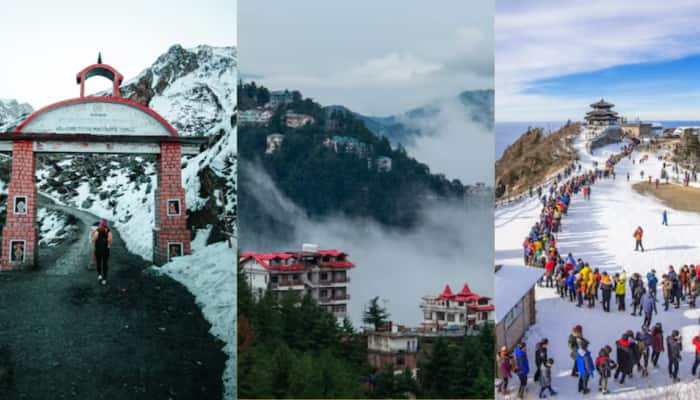Qutab Minar row: Delhi Waqf Board asks ASI to allow Namaz at mosque on premises, Saket Court to pronounce order in June
The Archaeological Survey of India (ASI) opposed a plea before a Delhi court seeking restoration of Hindu and Jain deities inside the Qutab Minar complex, saying it is not a place of worship and the existing status of the monument cannot be altered, said a PTI report.
- A Delhi court reserved the order on an appeal regarding the restoration of 27 Hindu and Jain temples in the Qutub Minar complex
- The plea alleged that the Quwwat-Ul-Islam Masjid situated within the Qutub Minar complex was built in place of a temple complex
Trending Photos
) Zee News file pic
Zee News file pic New Delhi: Even as Delhi`s Saket Court reserved the order on an appeal regarding the restoration of 27 Hindu and Jain temples in the Qutub Minar complex in Mehrauli, Capital's Waqf Board has claimed that Namaz used to be offered at a mosque there, that was stopped by the Archaeological Survey of India.
The ASI on Tuesday opposed a plea before a Delhi court seeking restoration of Hindu and Jain deities inside the Qutab Minar complex, saying it is not a place of worship and the existing status of the monument cannot be altered, said a PTI report.
In a letter to ASI Director-General last week, Delhi Waqf Board chairman Amanatullah Khan requested for allowing Namaz at the "ancient" Quwwat-ul-Islam mosque in Qutab Minor complex, claiming it was stopped by the ASI officials. The letter reportedly quotes him as saying, "Five-time daily prayers were offered by the Muslims at the mosque and the practice continued without any hindrance and interference since its inception."
Delhi Waqf Board chairman further said, "It is important to mention that the said mosque is duly notified Waqf property vide Gazette of Delhi administration dated 16.04.1970 and five time prayer is taking place at the said mosque since times immemorial," requesting the ASI DG for action against those officials who stopped Namaz at the mosque, and allow it without any restriction so that the peace and harmony of the area are "maintained".
Imam of the mosque, Maulvi Sher Mohammad appointed by the Waqf Board, had also written a letter to ASI in this regard on May 7, stating that the ASI officials were not allowing them to offer prayers in the mosque.
Court reserves order on plea to restore temples in Qutub Minar complex
Delhi`s Saket Court on Tuesday reserved the order on an appeal regarding the restoration of 27 Hindu and Jain temples in the Qutub Minar complex in Mehrauli. It was alleged in the appeal that the Quwwat-Ul-Islam Masjid situated within the Qutub Minar complex in Mehrauli was built in place of a temple complex.
After hearing the lengthy submissions of the appellant and other parties, additional District Judge Nikhil Chopra reserved the judgement in the matter and fixed June 9, 2022, for order.
According to reports, the court said that parties would be at liberty to file brief synopsis if any within a week, with an advance copy to the opposite party. Advocate Vishnu Jain appearing for the petitioner (Appellant) apprised the court that Quwwat-Ul-Islam Masjid situated within the Qutub Minar complex in Mehrauli was built in place of a temple complex.
Jain read Section 16 of the AMASR Act 1958 that says "A protected monument maintained by the Central Government under this Act which is a place of worship or shrine shall not be used for any purpose inconsistent with its character," submitting that "Once a deity always a deity and it has its dignity forever. It is the determination of character."
Meanwhile, appearing for Archaeological Survey of India (ASI) opposed the appeal and said Qutub Minar is a monument and no one can claim a fundamental right over such a structure.
As per the Ancient Monuments Act, the Qutub Minar Complex is a monument and no right to worship can be granted at this place. There is no provision under AMASR Act 1958 under which worship can be started at any living monument. High court of Delhi clearly mentioned in its order dated January 27, 1999, stated ASI.
The suit was filed on behalf of Jain deity Tirthankar Lord Rishabh Dev and Hindu deity Lord Vishnu (through their next of friends), seeking restoration of the alleged temple complex, comprising as many as 27 temples.
"The suit was filed to preserve and protect the religious and cultural heritage of India and to exercise the right to religion guaranteed by Article 25 and 26 of the Constitution of India by restoring 27 Hindu and Jain temples with respective deities which were dismantled, desecrated and damaged under the command and orders of Qutub-Din-Aibak, a commander of invader Mohammad Ghori, who established slave dynasty and raised some construction at the same very place of temples naming it as, Quwwat-Ul-Islam Mosque," the plea said.
The suit sought to declare that Lord Vishnu, Lord Shiva, Lord Ganesh, Lord Sun, Goddess Gauri, Lord Hanuman, Jain deity Tirthankar Lord Rishab Dev have the right to be "restored" within the temple complex at the site of Quwwatul Mosque Complex, Mehrauli, south-west Delhi "after rebuilding it with the same honour and dignity".
It also sought to issue an injunction directing the Central government to create a trust, according to the Trust Act 1882, and hand over the management and administration of the temple complex situated within the area of Qutub Complex in Mehrauli after framing a scheme of the administration to such trust.
"Pass a decree in the nature of a permanent injunction, restraining the defendants permanently from interfering in making necessary repair works, raising construction and making arrangement for the pooja, darshan and worship of deities in accordance with Sections 16 and 19 of `The Ancient Monuments and Archaeological Sites and Remains Act, 1958` by a trust, to be created by the Central government within the area," the suit said.
The ASI counsel reportedly submitted before the court that it would be contrary to the law to agree to the contention of any person claiming a fundamental right to worship at the 'centrally protected' monument, adding "Qutab Minar is not a place of worship and since the time of its protection by the central government, Qutab Minar or any part of Qutab Minar was not under worship by any community."
The counsel for the ASI further said that it was very clear from the Persian inscription at the Quwwat-ul-Islam mosque, that the cloisters were erected with carved columns and other architectural members from 27 temples. The revival of worship was not allowed wherever it was not practised at the time of protection of a monument, he added.
(With Inputs from Agencies)
Stay informed on all the latest news, real-time breaking news updates, and follow all the important headlines in india news and world News on Zee News.
Live Tv







)
)
)
)
)
)
)
)
)
)
